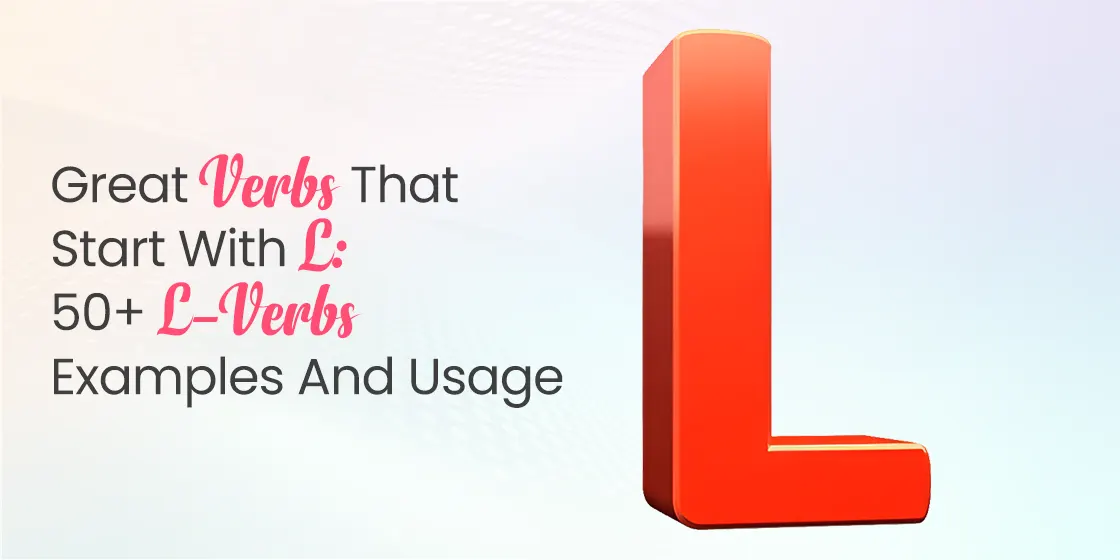Table of Content
Discover How the Best Verbs That Start With L Give Your Copy a Lascivious Vibe
Language lovers often find themselves captivated by the letter L, and for good reason. Verbs that start with L represent some of the most expressive and emotionally resonant action words in the English language. From the joyful “laugh” to the powerful “lead,” these words capture the full spectrum of human experience and activity.
The beauty of verbs beginning with L lies in their versatility and emotional depth. These action words span everything from physical movements like “leap” and “lift” to emotional states like “love” and “lament,” making them essential tools for effective communication in both formal and informal contexts.
Learning about L-verbs opens up a world of linguistic possibilities for writers, speakers, and language enthusiasts alike. Whether you’re looking to expand your vocabulary for creative and web copywriting services or improve your communication skills, exploring them provides valuable insights into how we articulate action and emotion. Let’s begin.
Understanding the Context of Verbs That Start with L
Verbs that start with L encompass a diverse collection of action words that describe physical activities, mental processes, emotional states, and social interactions. The letter L appears in approximately 4% of words used in the English language, making it a moderately frequent starting letter that offers rich vocabulary opportunities.
What makes verbs starting with L particularly interesting is their range of emotional connotations. Many L-verbs carry strong positive associations—words like “love,” “laugh,” “learn,” and “liberate” express growth, joy, and progress. These positive verbs that start with L are especially valuable for motivational writing and encouraging communication.
The structure of verbs that start with L also demonstrates the flexibility of English grammar. These verbs include regular and irregular forms, transitive and intransitive actions, and various degrees of formality. Understanding these patterns helps speakers and writers choose the most appropriate L-verb for their specific context and intended meaning.
Common Action Verbs That Start with L

Action verbs form the largest category of verbs that start with L, describing physical movements, concrete activities, and observable behaviors. These fundamental L-verbs are essential for narrative writing, instruction giving, and everyday communication.
Physical Movement Verbs:
- Leap – to jump or spring with force
- Lift – to raise or elevate something
- Lean – to incline or rest against something
- Launch – to set in motion or start something
- Lunge – to thrust forward suddenly
- Lumber – to move heavily or clumsily
- Lurch – to make sudden, unsteady movements
- Lounge – to recline or sit in a relaxed manner
- Lope – to run with long strides
- Limp – to walk unevenly due to injury
Manipulation and Work Verbs:
- Load – to put cargo or weight into something
- Lock – to secure with a key or mechanism
- Label – to attach identifying tags or names
- Lace – to fasten with cords or strings
- Layer – to arrange in levels or strata
- Level – to make flat or even
- Leverage – to use mechanical advantage or influence
- Lubricate – to apply oil or grease for smooth operation
- Locate – to find the position or place of something
These action verbs that start with L provide the foundation for describing physical activities and concrete behaviors. They’re particularly useful in technical writing, instruction manuals, and narrative descriptions where precise action is important.
Emotional and Mental Verbs That Start with L

Beyond physical actions, verbs that start with L encompass a rich variety of emotional expressions and mental processes. These vivid verbs help us articulate feelings, thoughts, and psychological states that are central to human experience and communication.
Emotional Expression Verbs:
- Love – to feel deep affection or attachment
- Laugh – to express joy or amusement audibly
- Lament – to express sorrow or regret deeply
- Loathe – to feel intense dislike or hatred
- Long – to yearn for something with deep desire
- Luxuriate – to enjoy something with great pleasure
- Lust – to feel intense physical or emotional desire
- Languish – to suffer from lack of attention or care
- Lull – to soothe or calm someone gently
- Lavish – to bestow generous amounts of attention or praise
Mental Process Verbs:
- Learn – to acquire knowledge or skills
- Listen – to pay attention to sounds or speech
- Look – to direct one’s gaze or attention
- Lecture – to give formal instruction or criticism
- Logic – to reason through problems systematically
- Liberate – to set free from restrictions or oppression
- Link – to connect or associate ideas or things
- Lose – to cease to have or be unable to find
These emotional and mental verbs that start with L are crucial for expressing inner experiences and psychological states. They enable writers and speakers to convey complex feelings and thoughts with precision and emotional impact.
Positive and Inspiring Verbs That Start with L

Some of the most uplifting verbs that start with L carry positive connotations and describe actions that build, support, and celebrate human achievement. These positive words can transform ordinary sentences into inspiring statements that motivate and encourage.
Growth and Development Verbs:
- Learn – to gain knowledge, skills, or understanding
- Lead – to guide, direct, or show the way
- Lift – to raise spirits, mood, or physical objects
- Lighten – to make less heavy, serious, or burdensome
- Lend – to provide temporary help or support
- Launch – to start new projects or initiatives
- Level – to create balance or equality
- Lengthen – to extend duration or size
- Legitimize – to make acceptable or valid
- Leverage – to use resources effectively for maximum impact
Celebration and Recognition Verbs:
- Laud – to praise highly or celebrate achievements
- Lionize – to treat someone as a celebrity or hero
- Luxuriate – to enjoy abundance or comfort fully
- Laugh – to express joy and create positive atmosphere
- Love – to show deep care and affection
- Liberate – to free from constraints or limitations
- Listen – to show respect and attention to others
- Liven – to make more energetic or exciting
These positive verbs that start with L are particularly valuable for motivational speaking, uplifting writing, and creating encouraging environments. They help build confidence, express gratitude, and celebrate human potential in both personal and professional contexts.
Professional and Technical Verbs That Start with L

The professional world utilizes numerous specialized verbs that start with L to describe business processes, technical procedures, and workplace activities. These terms, consisting of positive, negative, and neutral tone words, are essential for effective communication in various industries and academic fields.
Business and Management Verbs:
- Lead – to guide teams or organizations
- Launch – to introduce new products or services
- Leverage – to use resources for competitive advantage
- License – to grant permission for use
- Liquidate – to convert assets to cash
- Lease – to rent property or equipment
- Lobby – to influence decision-makers
- Liaise – to establish communication links
- Limit – to set boundaries or restrictions
- List – to enumerate items or go public with stocks
Technical and Scientific Verbs:
- Log – to record data systematically
- Link – to connect systems or networks
- Load – to input data or programs
- Locate – to determine position or find files
- Loop – to repeat processes cyclically
- Lock – to secure access or prevent changes
- Label – to categorize or tag information
- Layer – to organize in hierarchical levels
- Launch – to start programs or operations
- Liquefy – to convert solids to liquid state
These professional verbs that start with L demonstrate expertise and precision in specialized communication. They’re crucial for technical documentation, business reports, and industry-specific discussions while maintaining clarity for colleagues and clients.
Verbs That Start with L in Different Tenses
Understanding how verbs that start with L change across different tenses is essential for proper grammar usage. Most L-verbs follow regular conjugation patterns, but several irregular forms require special attention for accurate communication.
Regular Verb Conjugations:
- Launch: launched, launching, launches
- Learn: learned, learning, learns
- Listen: listened, listening, listens
- Label: labeled, labeling, labels
- Level: leveled, leveling, levels
- Limit: limited, limiting, limits
- Link: linked, linking, links
- Load: loaded, loading, loads
- Lock: locked, locking, locks
- Love: loved, loving, loves
Irregular Verb Conjugations:
- Lead: led, leading, leads
- Leap: leaped/leapt, leaping, leaps
- Lend: lent, lending, lends
- Lie: lay, lying, lies (to recline)
- Lie: lied, lying, lies (to tell falsehoods)
- Light: lit/lighted, lighting, lights
- Lose: lost, losing, loses
- Leave: left, leaving, leaves
Special Usage Notes:
- Lie has two distinct meanings with different conjugations
- Light accepts both “lit” and “lighted” as past participles
- Lead (verb) changes to “led,” not to be confused with “lead” (noun)
Mastering these conjugations ensures that verbs that start with L are used correctly across all grammatical contexts, from simple past narration to complex conditional constructions.
Common Phrasal Verbs That Start with L

Phrasal verbs combine verbs that start with L with prepositions or adverbs to create new meanings. These combinations are essential for natural, fluent English communication and often carry idiomatic meanings that differ from their component parts.
Popular L-Phrasal Verbs:
- Look up – to search for information or improve
- Look out – to be careful or watch for danger
- Look after – to take care of someone or something
- Look into – to investigate or examine carefully
- Look forward to – to anticipate with pleasure
- Lay off – to dismiss from employment
- Lay out – to arrange or plan systematically
- Lead up to – to prepare for or result in
- Leave out – to omit or exclude
- Let down – to disappoint someone
- Let up – to diminish or stop temporarily
- Live up to – to meet expectations or standards
- Lock up – to secure or imprison
- Log in/on – to access a computer system
Business and Professional Phrasal Verbs:
- Launch into – to begin enthusiastically
- Level with – to be honest and direct
- Line up – to arrange or schedule
- Link up – to connect or join together
- Load up – to fill completely or heavily
These phrasal verbs that start with L add nuance and colloquial flavor to English expression. They’re particularly common in spoken English and informal writing, making them essential for achieving natural-sounding communication in various contexts.
Creative Uses of Verbs That Start with L
Verbs that start with L offer exceptional opportunities for creative expression, whether in literature, poetry, or persuasive writing. These action words can create vivid imagery, establish mood, and convey complex emotions with remarkable effectiveness.
Writers often use L-verbs to create alliteration and rhythm in their prose. Phrases like “light lingered lovingly” or “laughter lifted spirits” demonstrate how these verbs can enhance the musical quality of language. The sound of the letter L itself—a liquid consonant—creates smooth, flowing effects that many writers find aesthetically pleasing.
In metaphorical usage, verbs that start with L often represent transformation and growth. “Launch” suggests new beginnings, “liberate” implies freedom from constraints, and “lift” can describe both physical and emotional elevation. These metaphorical applications make L-verbs particularly powerful for inspirational and motivational writing.
Frequently Asked Questions
| What are the most common verbs that start with L? The most common verbs that start with L include love, learn, look, listen, laugh, lead, lift, leave, lose, and live. These verbs are frequently used in everyday conversation and appear across various contexts from casual speech to formal writing. |
| Are there any irregular verbs that start with L? Yes, several irregular verbs start with L, including “lead” (led), “leap” (leaped/leapt), “lend” (lent), “lie” (lay/lied), “light” (lit/lighted), “lose” (lost), and “leave” (left). These verbs don’t follow standard -ed ending patterns for past tense formation. |
| How can I remember the difference between “lie” and “lay”? Remember that “lie” means to recline (past tense: lay, past participle: lain) and is intransitive, while “lay” means to place something down (past tense: laid, past participle: laid) and requires a direct object. “Lie down on the bed” vs. “Lay the book on the table.” |
| What are some positive verbs that start with L for motivation? Positive verbs that start with L include learn, lead, lift, lighten, liberate, laud, launch, lend, love, and laugh. These words create encouraging, uplifting tones in speech and writing, making them perfect for motivational contexts. |
| Can verbs that start with L be used in professional writing? Absolutely! Professional verbs that start with L include lead, launch, leverage, license, liquidate, liaise, lobby, limit, locate, and link. These words are essential for business communication, technical writing, and academic contexts while maintaining professional tone. |
Conclusion
Verbs that start with L represent a remarkable collection of action words that span physical activities, emotional experiences, mental processes, and professional tasks. From the nurturing actions of “love” and “lift” to the dynamic movements of “leap” and “launch,” these verbs provide essential tools for clear, expressive communication.
Understanding and utilizing verbs that start with L effectively can transform your writing and speaking, making your language more precise, engaging, and emotionally resonant. Whether you’re crafting a story, giving instructions, expressing feelings, or conducting business, these L-verbs offer the versatility and power needed to convey exactly what you mean.
As you continue developing your vocabulary, remember that verbs that start with L are more than just words—they’re bridges between thoughts and actions, connecting your ideas with the world around you. Practice using them regularly, explore their various forms and combinations, and discover how they can enhance your ability to communicate with clarity, creativity, and emotional depth.

Unleash your brand story`s potential with eContentSol – your creative writing companion. We craft narratives that captivate. Ready to elevate your content game? Dive into creativity with us and let`s bring your ideas to life.


